As a wholesale dealer of precious and semi-precious gemstones, Kimberly Collins has seen a lot of things change in the industry over the last 30 years. Most notably is the increase of attention on the ethical and sustainable standards surrounding the sourcing of gemstones.
“I am consistently asked for the origin of my gemstones,” said Collins, Owner and Founder of Kimberly Collins Colored Gems. “Customers are much more interested in treatment (heat, oil, no heat, etc.) than before. They’re also concerned that the practices in sourcing these gemstones are sustainable and ethical. They also care about quality.”
Collins mostly works with retail stores that are on the front lines with consumers who expect more out of the jewelry they buy than just commemorating special occasions. Topping consumer concerns are issues like where the gems come from, how and where they are mined, if those processes negatively impact the environment and if human rights or laws were broken to get them. These kinds of ethical considerations are fueling purchase decisions beyond just the cut and clarity of the gemstone.
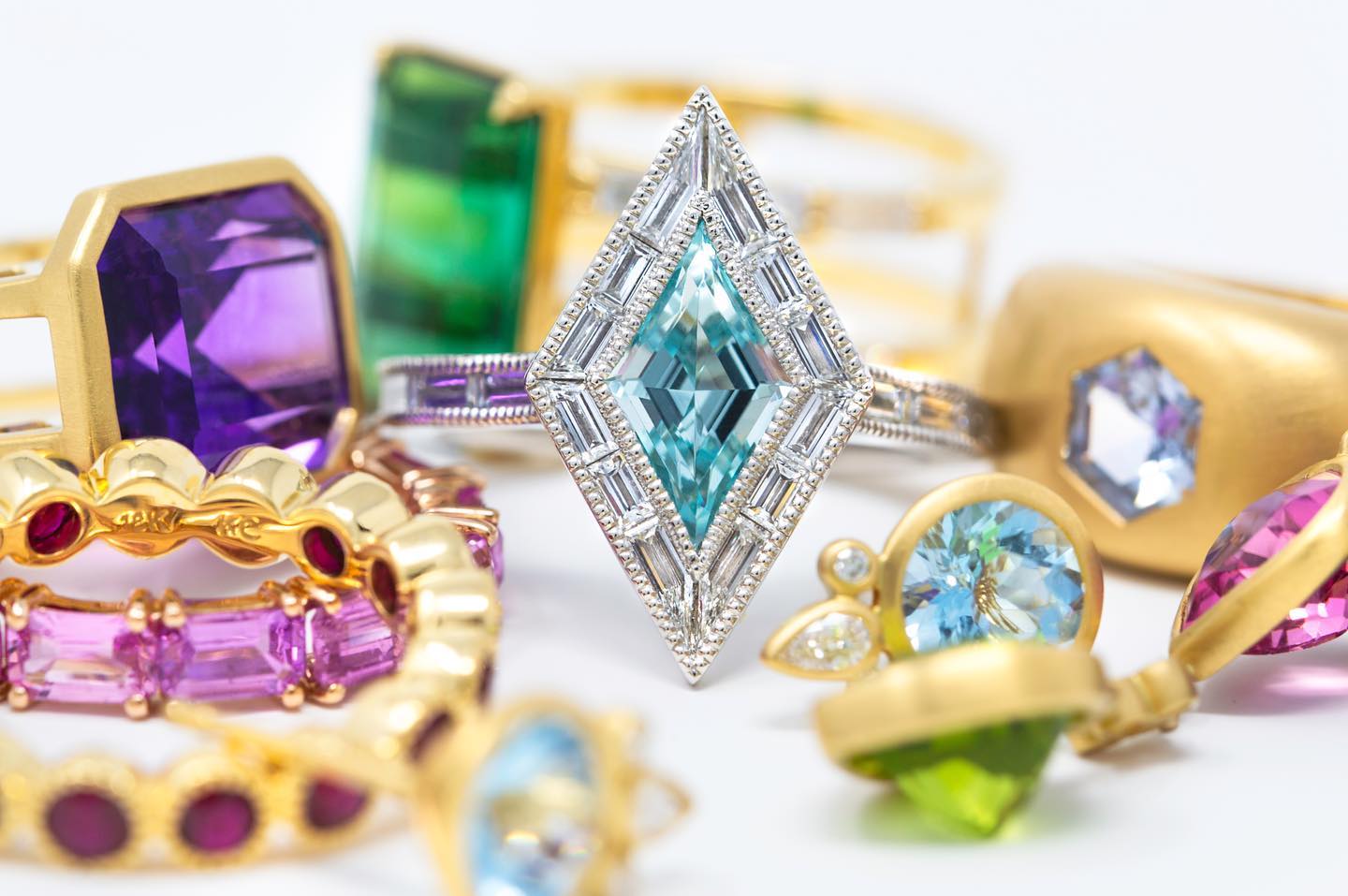
Kimberly Collins Colored Gems promotes natural colored gemstones while sourcing from sustainable mining practices. (Photo: Kimberly Collins Colored Gems | Facebook)
As a member of the American Gem Trade Association (AGTA), Collins sells with confidence because of the stringent standards that she is held to in an organization whose dealers work with some of the most recognized jewelry manufacturers, designers and retailers in the world.
“I hear the term 'blood diamond' a lot and as an AGTA member I am always able to ensure that every aspect of my supply chain is held to the highest ethical standard,” said Collins.
The increase in ethical and sustainable concerns in the gem industry has spurred a boom in marketing buzzwords related to both natural gemstones and alternatives like lab-grown diamonds. This causes confusion in determining what’s honest and what’s just greenwashing.
A push is underway in the gem and jewelry industry to give consumers, dealers and retailers who care about ethical sourcing a way to buy and sell with confidence.
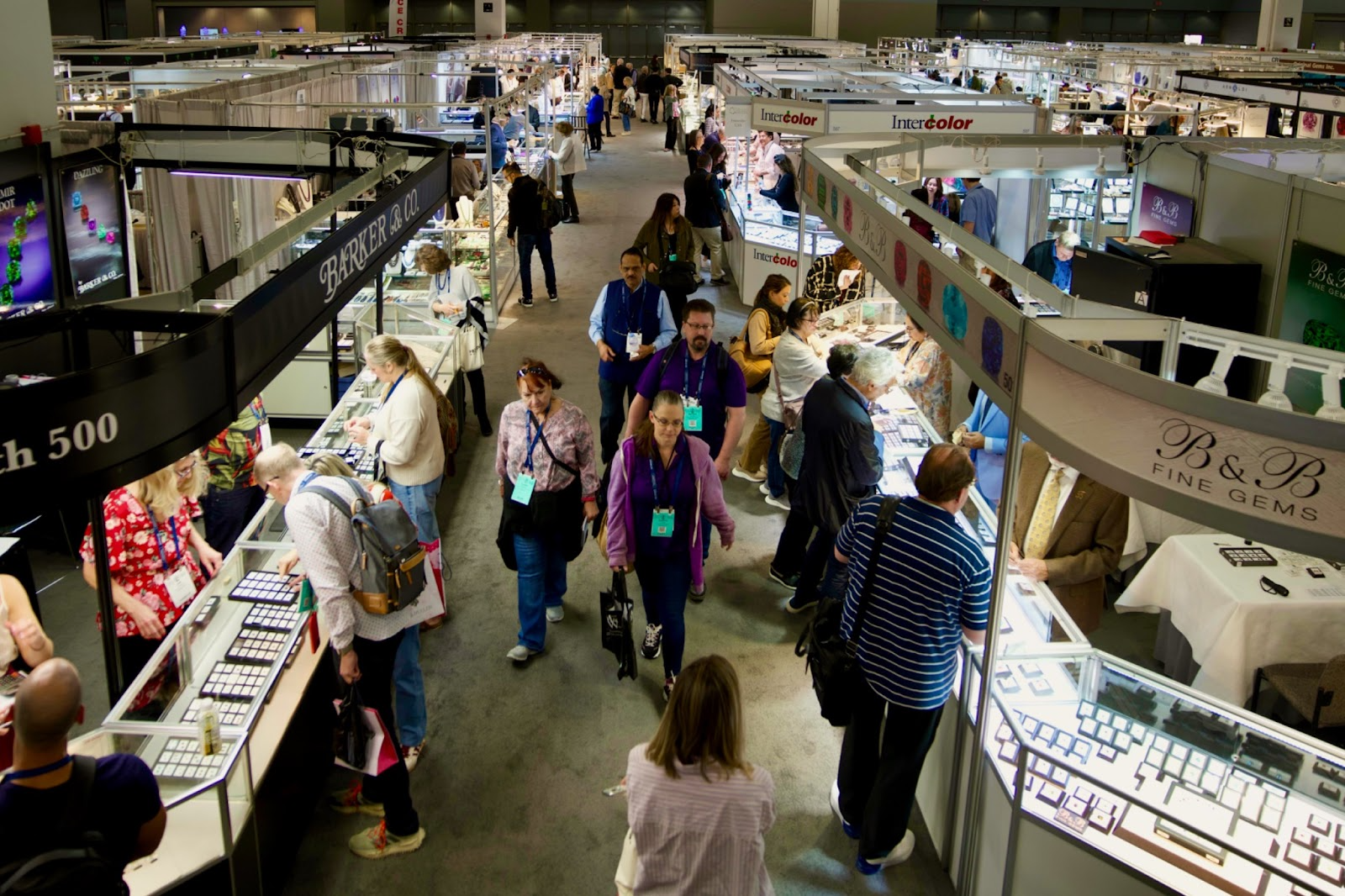
AGTA annual GemFair in Tucson. (Photo: American Gem Trade Association)
What is Ethically Sourced Jewelry?
The root of ethically sourced gems and jewelry is found through transparency in the supply chain that exposes social, political and environmental issues from the mines to the end-consumer.
The social and political issues relate to child labor, dangerous working conditions (both in the mines and with gem cutting), conflict and human displacement. The environmental impacts of gem mining relate to issues like deforestation, air and water pollution, soil degradation and the destruction of ecosystems.
While the ethical and sustainable issues facing the industry fall under broad categories, each encompasses a wider range of sub-issues that differ among countries around the world. This makes creating that transparency difficult along the complex supply route.
The nonprofit AGTA has focused on ethical sourcing and simplifying supply chain transparency since its inception in 1981.
“If you're given something by a significant other or your mother or your father, why would you ever want anybody to have suffered in producing that? Or, for it to be produced in a way that would harm the environment? That's why these words have been around a long time. That's what we stand for and our members stand for,” said John Ford, CEO of the American Gem Trade Association.
The AGTA represents over 1000 members in the United States and Canada, and it operates GemFair, largest loose gem trade show in the world in Tucson each year. The organization prides itself on being an industry example to promote and maintain the highest ethical standards among its members within the colored gemstone industry.
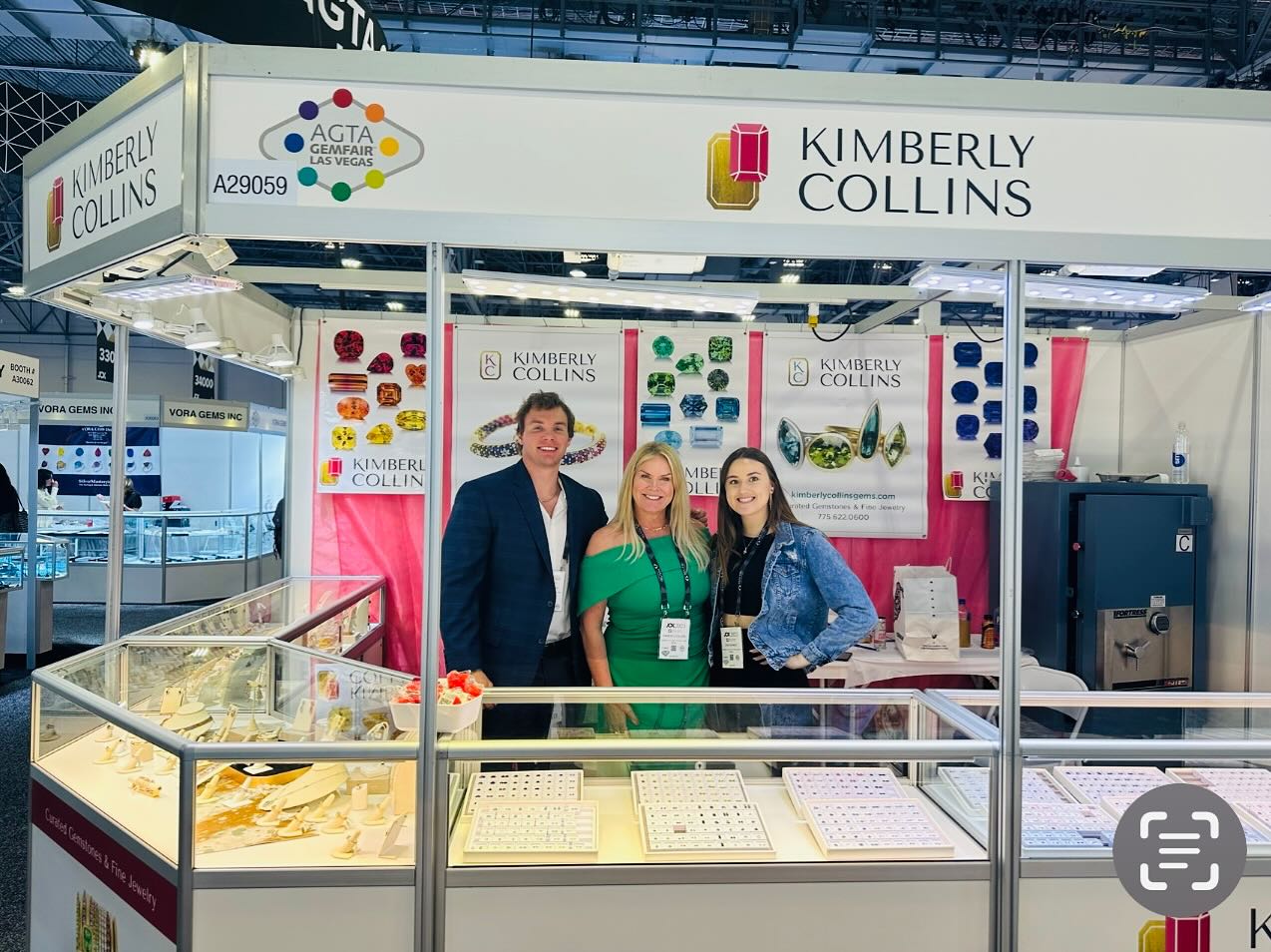
Kimberly Collins and team prep for AGTA GemFair Tucson. (Photo: Kimberly Collins Colored Gems | Facebook)
The cornerstone of AGTA membership is a stringent code of ethics that members must sign and abide by that applies whether they sell natural, or lab grown or synthetic gemstones.
The AGTA Code of Ethics includes abiding by local laws where gems are mined, operating legally, paying taxes, having paper transactions and following advertising guidelines. They go one to include that gems are not sourced or mined using child labor, are mined responsibly to protect and restore the environment and that gems are processed with an effort to protect the health of workers. Members also cannot make claims that are not substantiated.
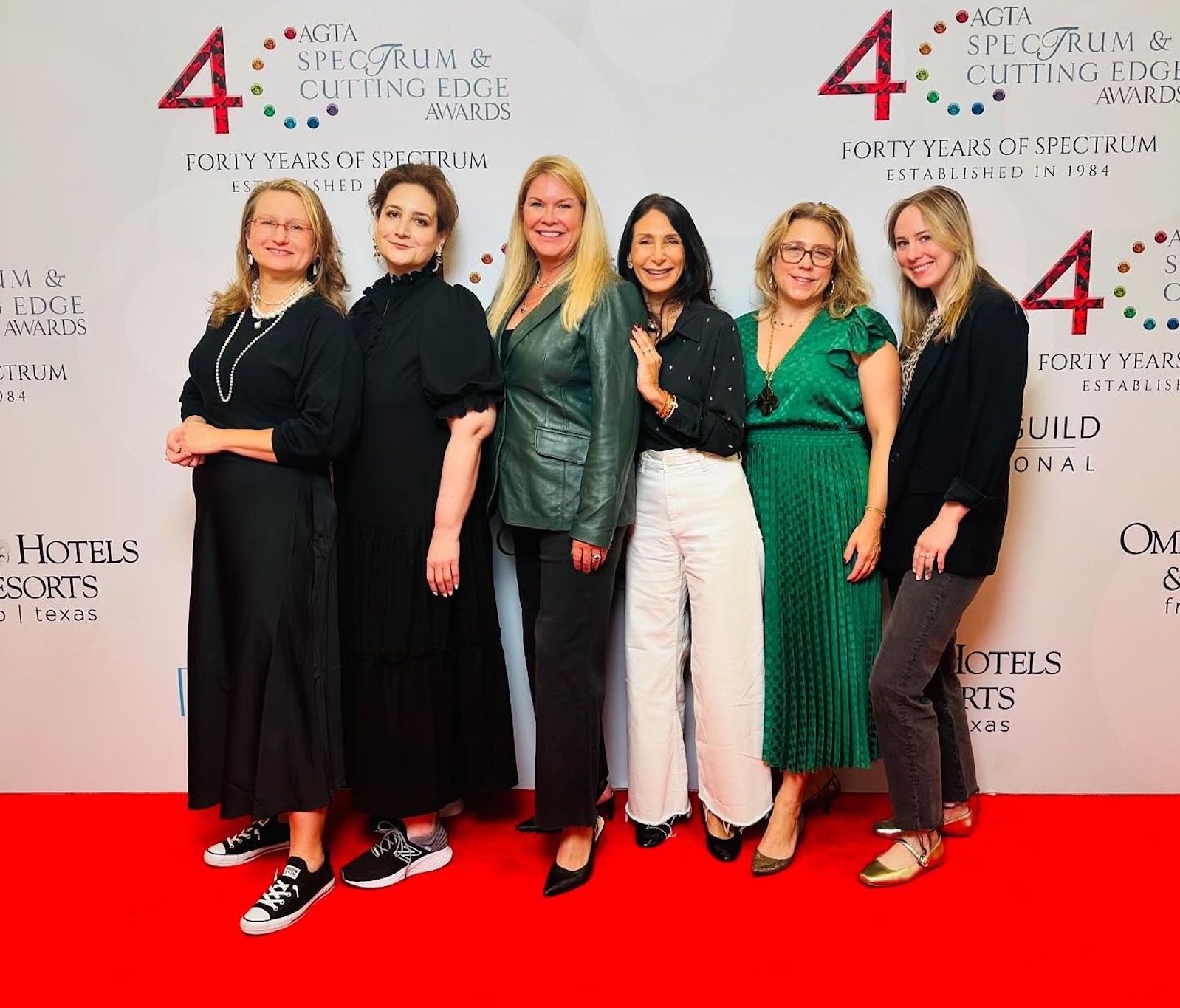
Kimberly Collins and team attend the 2024 AGTA Spectrum & Cutting Edge Awards in Dallas, Texas. (Photo: Kimberly Collins Colored Gems | Facebook)
“These due diligence requirements all specified in writing were done long before this became, I guess you'd say, popular or trending,” said Ford. “This is something that's been in our DNA for a very long time and it's something that our members take extremely seriously.”
These promises only matter if they are enforced but the self-policing protocol that AGTA has in place adds another layer of checks and balances for consumers, dealers and retailers.
Ethically sourced commitments are part of the bigger sustainability issue facing both the natural gem and lab-grown gem industries. Putting the spotlight on the key issues that have negative social, political and environmental impacts enables consumers to fairly evaluate and compare their options within segments of the industry and broadly across the board.

Jeweler inspecting an engagement ring diamond. (Photo: SCS Global Services)
Defining Standards
Part of the challenge of reigning in the issues surrounding ethically sourced gems and jewelry is that for decades there were no industry standards in terminology or consumer expectations.
“There wasn't really a good comprehensive sustainability analysis that would answer the full spectrum of issues that consumers care about. And it’s not just in this industry but in every industry where these topics have come up,” said Linda Brown, Senior Vice President and Co-Founder, SCS Global Services.
SCS Global Services is an independent, third-party audit and certification company founded in 1984 to advance social responsibility, environmental stewardship and product safety in multiple industries across six continents. The company is instrumental in defining standards in the industries of sustainable forestry, sustainable agriculture, the green building sector and sustainable seafood. Its focus now is to do the same for the gem and jewelry industry by leveraging some lessons learned along the way.
There are many cross-industry commonalities like definitions that vary among stakeholders and a lack of clarity about consumer expectations for the products they buy related to social, political or environmental implications.
“It's a complex, comprehensive set of issues that have to be looked at if someone is going to credibly talk about sustainability,” said Brown.
The term itself, sustainability, has also evolved over time which makes creating a common definition difficult.
“It's a communications challenge,” said Brown. “Sustainability has really evolved in the marketplace more broadly as having certain meanings. It has that environmental component, it has that social component, and it has that governance component,” said Brown.
One way that SCS Global Services works to establish an industry standard for what sustainability performance means is by working with multi-party stakeholders. Its first standardized result for the gemstone industry was creating the SCS Certification for Sustainability Rated Diamonds. It was released as a pilot program in 2021 and formally implemented in the industry in 2024.
This sustainability certification has five pillars that establish a credible basis to identify the production-related details of gemstone quality diamonds. These pillars identify origin traceability, ethical stewardship, net zero carbon footprint, sustainable production practices and sustainability investments.
This certification standard provides a basis from which to evaluate the issues related to both natural and lab-grown diamonds. For example, land and labor issues are more tightly tied to mined diamonds whereas energy use is more closely tied to lab-grown diamonds. Though these are different issues they all have potential impacts on the environment, health and human dignity and social responsibility.
Defining industry standards makes it possible for every segment of the industry to operate off the same terminology and expectations.
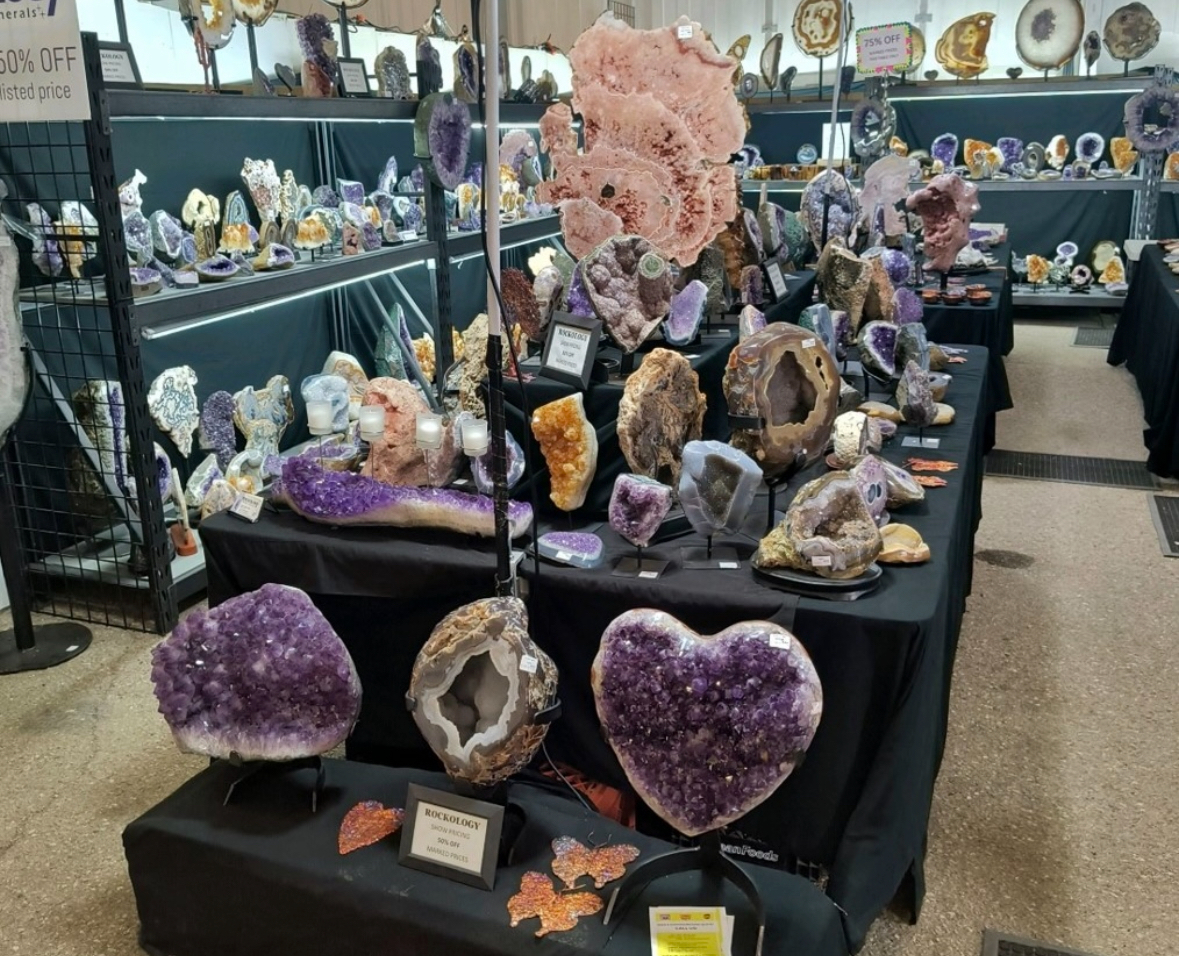
A gemstone dealer’s booth at the AGTA GemFair in Tucson. (Photo: Shelley Hamper)
Why Supply Chain Traceability Matters
The 2006 movie Blood Diamond delivered a surge of reality to mainstream consumers about some of the ugly truths of the gemstone industry that end-buyers previously didn’t seem to question. Today’s consumers are prioritizing how their behavior and purchase decisions impact the environmental and global human rights which is why supply chain traceability matters.
The food industry faced a similar progression in consumer backlash that started in the 1970s with labor issues, followed by pesticide residue concerns in the 80s and sustainability concerns in the 90s.
Consumer expectations for supply chain traceability pushed the food industry to respond. Today, consumers can easily identify their food sourcing from the labels on fish and other items in the grocery store.
“Food products used to just say things like ‘natural’ and ‘healthy,’ and those kinds of claims are no longer,” said Karen Righthand, Vice President of Corporate Marketing for SCS Global Services. “If we want organic strawberries none of us would think about just taking a grower's word for it. We're looking for USDA organic or we're looking for those third-party certifications and Gen Z research is showing that they're increasingly savvy on these fronts, so that's the state of the market today."
That consumer expectation is propelling the jewelry industry in the same direction. Consumers are empowered by their choice to not support what they do not value. The journey of a gem from the mine to the retail store is just as important to them as the quality of the gem itself.
“I think consumers are starting to expect it and even demand it in their products,” said Kat Weymouth, Program Director for Sustainability Rated Diamonds for SCS Global Services.
And it's not just consumers who want supply chain traceability—dealers want it too.
“When I talk to our retail members, conversations are coming up more often about forced labor, smuggling, especially with Russian diamond sanctions and environmental concerns,” said Ford.
The focus on supply chain traceability among those who wholesale and buy gems, and the end-consumer is forcing more transparency in the industry.
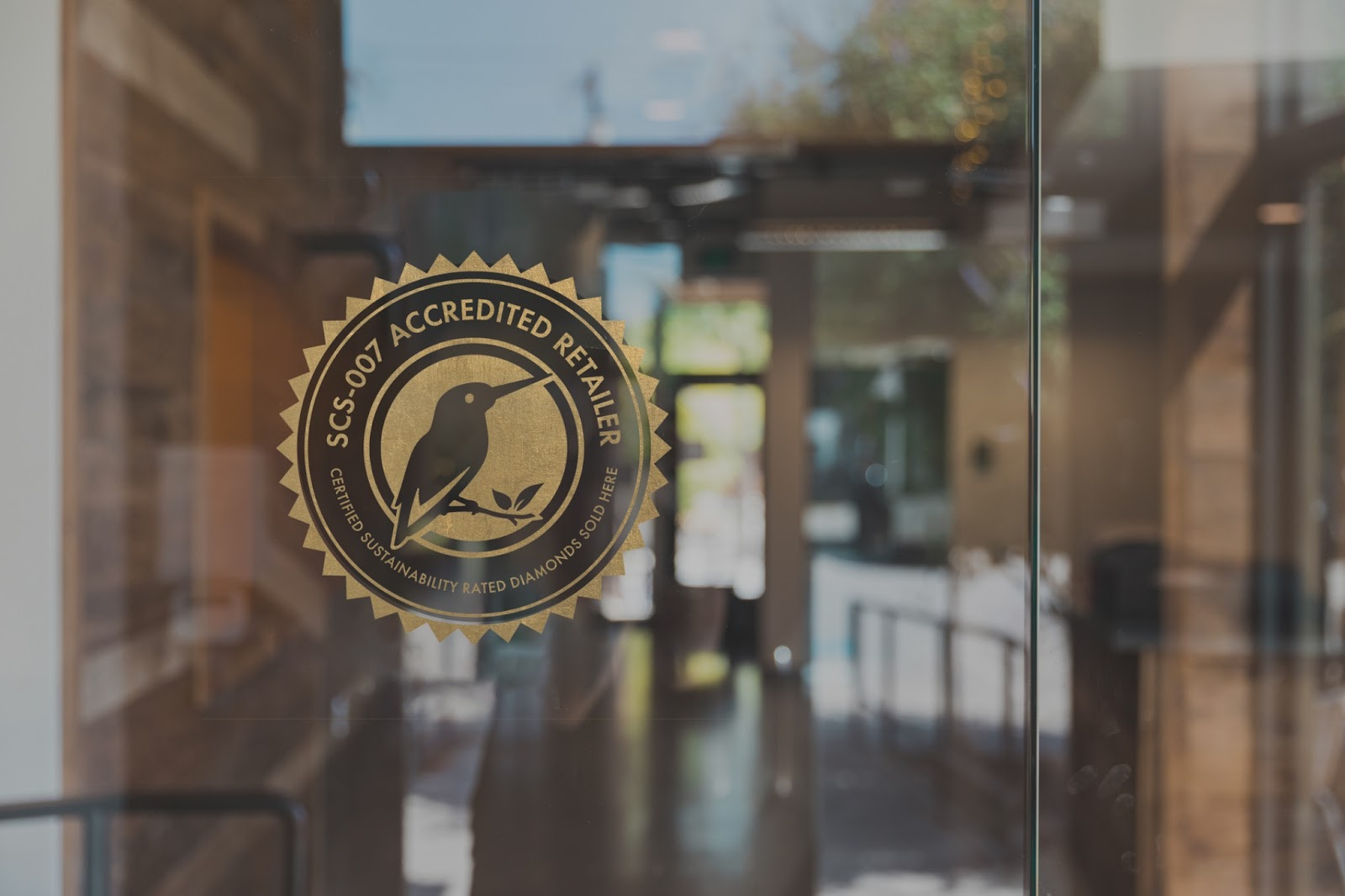
A Jewelry store showing its sustainability rated diamonds certification on the door. (Photo: SCS Global Services)
Consumer Knowledge
Expecting traceability is one thing but knowing how to ask for it is an entirely different challenge for consumers who want to discern what’s authentic and what is being misrepresented. Two ways to ask for authenticity are through product certifications and member affiliations.
The same way that consumers can ask for a diamond’s laboratory grading certificate, they can also ask for a sustainability rated diamond certificate.
SCS Global Services conducts in-person, independent, third-party certification audits for both natural and lab-grown gemstones. Each stone receives a sustainability score that covers its traceability. The rigorous certification process gives consumers and jewelers another tool to prove authenticity.
“It's easy to say traceability, but it can be confusing if you're a consumer to look under the hood and see what's there if it all sounds the same,” said Brown. “We have third party auditors on the ground looking at these operations. It's not just some paper trail. We also have testing technology and other means of traceability.”
Consumers can also ask for dealer affiliations with credible organizations like AGTA where members must be able to substantiate any claims they make about their products.
“In greenwashing people might say, ‘this stone is more environmentally friendly than this stone’ for example. To be an AGTA member, you would have to have proof that it is fact. You just can't make claims. You have back it. If anybody says they're abiding by fair-trade protocols, et cetera, they have to actually be doing what they say they're doing,” said Ford.
The same goes for accurately disclosing what an item is, for example, if it has been treated.
Asking for documentation of certifications and membership affiliations are ways consumers can collect proof to ensure they are dealing with reputable jewelers and have confidence in the sourcing of the gemstones they’re buying. 
A variety of loose diamonds. (Photo: SCS Global Services)
The Future of Sourcing Expectations
Just as the food industry adapted to the demands of consumers wanting to be informed about where their food comes from, the gem and jewelry industry is actively following suit with more transparency.
The AGTA sees this as a good thing for both consumers and for the long-term interests of businesses in the industry.
“That is something that's critical and that's why we're on a crusade to basically spread our nomenclature and our code of ethics as far as we can in the industry,” said Ford.
SCS Global Services is also on that crusade by involving multi-industry stakeholders and consumers in a way that ensures products maintain the highest ethical standards.
As a jewelry designer and gemstone dealer, Kimberly Collins says this push for ethical accountability from within the industry is important.
“The foundation of my business is built upon trust. Trust in my suppliers, trust in the relationships I’ve cultivated within the industry, and trust with my clients. The amount of trust you can place in knowing the gemstone you purchase comes from an ethical and reputable seller is priceless,” said Collins.

Kimberly Collins and fiancé Mike get engaged on the beach earlier this year with a cushion cut Colombian emerald. (Photo: Kimberly Collins Colored Gems | Facebook)
Gemstone and jewelry define many of life’s most important occasions, becoming forever heirlooms for the people who buy them. The push to arm consumers with knowledge and credible dealers with industry standards is what separates substance from rhetorical buzzwords when it comes to identifying ethically sourced products.
